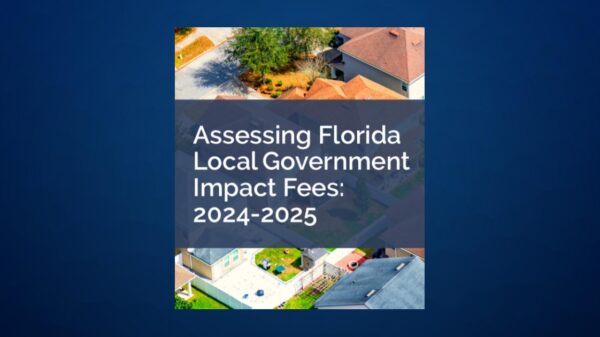By: Dr. Edward Longe
As Florida’s population ages, the state faces unprecedented healthcare challenges. By 2045, over 8 million Floridians will be 60 or older, placing immense strain on an already burdened healthcare system. But amidst these challenges lies an opportunity for innovation. Artificial Intelligence (AI) is emerging as a powerful tool to transform elderly care, offering solutions that could improve health outcomes, reduce costs, and enhance the quality of life for Florida’s seniors.
The potential applications of AI in elderly healthcare are vast and exciting. One of the most promising areas is early disease detection. Researchers have developed AI models that can predict the onset of Alzheimer’s disease up to seven years before symptoms appear. For a state grappling with a growing Alzheimer’s crisis, this technology could be game-changing, allowing for earlier interventions and better preparation for both patients and families.
Another critical area where AI is making strides is in the detection and treatment of sepsis, a life-threatening condition that disproportionately affects older adults. Tampa General Hospital has implemented an AI-powered Sepsis Rapid Response system, which analyzes real-time patient data to detect potential sepsis cases. The results have been remarkable, with a 3% reduction in sepsis-related mortality, translating to approximately 200 lives saved.
AI is also enabling innovative care models like Hospital at Home programs. These initiatives allow patients to receive hospital-level care in the comfort of their own homes, monitored remotely by healthcare professionals. AI algorithms can monitor vital signs, reducing hospital stays and improving patient comfort and dignity. For Florida’s elderly population, who often prefer to age in place, this could be a significant boon.
The technology is even tackling one of the most pervasive issues facing seniors: loneliness. AI-enabled companions, from robotic pets to conversational agents, are being deployed to provide engagement and support for isolated seniors. In Broward County, a pilot program is using AI-powered robotic animals that can tell jokes, remind seniors to take medications, and conduct regular check-ins. While not a replacement for human interaction, these companions can provide critical engagement for seniors who might otherwise spend much of their time alone.
Fall prevention is another area where AI is making a significant impact. Smart AI systems can detect falls and immediately alert caregivers, dramatically reducing response times. Some nursing homes in Florida have begun integrating AI-enabled smart lamps that can detect falls and alert caregivers within minutes. Given that falls are a leading cause of injury and death among seniors, this technology could be life-saving.
Perhaps one of the most critical applications of AI in healthcare is its potential to address labor shortages. Florida, like many states, is facing a shortage of healthcare professionals, particularly in rural areas. AI can help bridge this gap in several ways. It can assist in training healthcare providers more efficiently, predict hospital demand to ensure appropriate staffing, and even provide preliminary screenings and diagnoses in areas lacking primary care providers.
However, as with any transformative technology, the integration of AI into elderly healthcare comes with challenges. Regulatory hurdles and slow FDA approval processes can delay the deployment of potentially life-saving technologies. There are also significant concerns around data privacy and security, given the sensitive nature of health information. Some worry about the potential disruption of the traditional patient-provider relationship, fearing that over-reliance on AI could lead to a loss of the human touch in healthcare.
There’s also the critical issue of ensuring that AI systems are unbiased and work effectively for all populations. Given that older adults are often underrepresented in the datasets used to train AI models, there’s a risk of developing tools that aren’t optimized for senior care.
To harness AI’s full potential in elderly care while addressing these challenges, policymakers and healthcare leaders in Florida will need to take a thoughtful, balanced approach. First and foremost, patient needs must be prioritized. Any policy or regulation should be evaluated based on how it impacts the quality and accessibility of care for Florida’s seniors.
While regulation is necessary to ensure safety and efficacy, overly burdensome rules could stifle innovation. Policymakers should strive to create a regulatory environment that encourages responsible innovation while protecting patient interests. This includes developing clear definitions for AI systems subject to regulation and creating streamlined approval processes for low-risk applications.
Data privacy and security must be paramount. As AI systems rely on vast amounts of personal health data, robust protections must be in place to safeguard this information. At the same time, policies should enable beneficial uses of data that can improve health outcomes and advance medical research.
The legal landscape will also need to evolve. Current liability and malpractice laws may not be adequate for an era where AI plays a significant role in medical decision-making. Updating these laws to clearly delineate responsibilities and liabilities in AI-assisted healthcare will be crucial.
Infrastructure considerations are also important. The widespread deployment of AI in healthcare will require significant computing power and energy resources. Florida will need to ensure its energy infrastructure can support this increased demand reliably and sustainably.
As Florida navigates this AI revolution in healthcare, it has the opportunity to become a national leader in innovative elderly care. By embracing AI responsibly and creatively, the state can develop a healthcare system that not only meets the needs of its growing senior population but sets new standards for quality, efficiency, and patient-centered care.
The future of elderly healthcare in Florida is not just about managing demographic challenges; it’s about reimagining what’s possible. With AI, we have the tools to create a healthcare system that’s more predictive, personalized, and proactive. We can envision a future where diseases are caught earlier, where hospital stays are shorter and less frequent, where seniors can age comfortably in their own homes with the support they need, and where healthcare providers are empowered to deliver the best possible care.
But realizing this vision will require collaboration across sectors – from policymakers and healthcare providers to tech innovators and patient advocates. It will require a willingness to embrace change while staying true to the fundamental values of compassionate, patient-centered care.
As Florida stands at this crossroads, the choices made today will shape the health and well-being of millions of seniors in the years to come. By harnessing the power of AI thoughtfully and responsibly, Florida can lead the way in creating a healthcare system that doesn’t just cope with an aging population, but thrives because of it, setting a model for the nation and the world.
Dr. Edward Longe is the director of the Center for Technology and Innovation at The James Madison Institute.





















